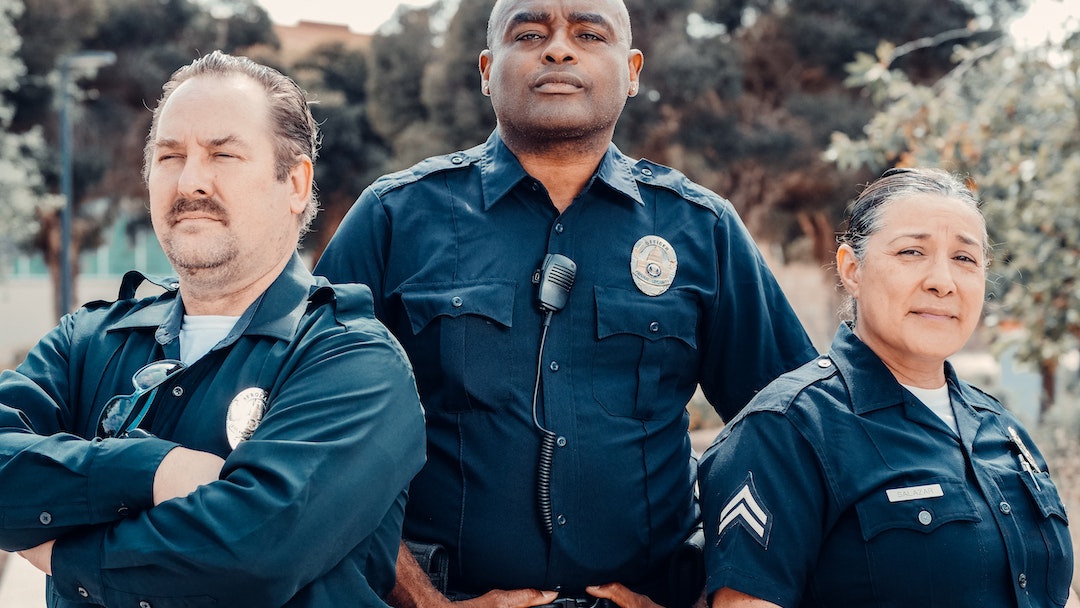Police are allowed to lie to you. One might believe that if you ask an undercover cop if they are a police officer they have to tell you. That’s not true. Police can and will lie to you.
It’s legal for cops to lie
- The Police may legally lie, bluff, mislead and intimidate you.
The police may not “strong arm” you into a confession.
- depriving the defendant of food, water, or use of the bathroom
- threats (threats to carry out the law like threatening to arrest a codefendant are usually acceptable)
- promises of “leniency” – even though they do.
- kicking, striking, or otherwise getting physical with a suspect.
- interrogating the suspect at gunpoint.
When encountering any law enforcement agency remember… they are not your friend
Famous one liners
- The famous line… Your partner is spilling the beans in the next room.
- Another famous line… This is just between you and me.
- Another one… Help me help you. Come clean and we will go easy on you.
- Here’s a good one… Talk to me and I’ll talk to the prosecutor about going easy on you.
- “There is video evidence”
- So many more
The Police Encounter will escalate negatively if and when a person:
- Makes an admission of guilt
- Consents to a search.
- Offer information that is unresponsive to the questions asked.
Refusing to answer questions is not an admission of guilt
- Asserting your right to remain silent is not an admission of guilt
- Demanding to have your lawyer present during any questioning is not an admission of guilt
- Refusing a search is not an admission of guilt.
Officers must have a reasons to detain you, if they do not, you are free to leave.
- If you are free to leave, and not being detained,
- What you say can and will be used against you.
- Miranda Rights are required to be read only if you are in “police custody” and you are being interrogated.
- Miranda warnings are not required to be read to you when you are arrested. If you are in police custody and you are not Mirandized, and you begin to talk or discuss something, and you have not been Mirandized, the statements can and will be used against you.
- If you are in custody… the police have no obligation to Mirandize you.
- Miranda Warnings are not required when the police are merely investigating, and the requirement of Miranda only applies after the police have arrested you, seized your person and specifically have begun to interrogate you, and or illicit information about the investigation or the alleged crime that has resulted in your arrest or custody.
- One of the Operative facts for 4th Amendment issues is the Seizure, arrest or detention of the person.
Law Enforcement Encounter? Remain silent and request your lawyer. Komorn Law 248-357-2550
Be aware of Phrasing:
- “Have you had anything to drink tonight?”
Best response is: NO - Where are you coming from?
It is best to have this answer pre-prepared so as to not raise suspicion. You can also answer the Officer’s questions by stating “Respectfully officer, I don’t have to answer that.” - “Not answering is suspicious, why are you not answering my question, clearly you are doing something wrong?”
Best Answer: “Officer, respectfully I am aware of my rights, and constitutional protections, and I know I have no legal obligation to answer your questions. - “Not answering is resisting me in this investigation”
Best Answer: “I’m not resisting, respectfully, I don’t have to answer anything.” - “If you have nothing to hide, you don’t mind if I look around.”
Best response: “I’m sorry Officer, but I don’t consent to searches.” - “If you refuse a search, I’ll have to call a K-9 unit.”
Best response: “Officer, are you detaining me, or am I free to go?” Officers cannot detain you past the purpose of the traffic stop and detaining you beyond this purpose is constitutionally illegal. Specifically officers cannot detain you beyond the traffic stop for the purpose of calling for a k-9 unit or drug sniffing dog.
Remember
- Refusing to answer questions is not an admission of guilt
- Asserting your right to remain silent is not an admission of guilt
- Demanding to have your lawyer present during any questioning is not an admission of guilt
- Refusing a search is not an admission of guilt.
Supreme Court Case
Cupp, 394 U.S. 731 (1969), was a United States Supreme Court case that affirmed the legality of deceptive interrogation tactics. On its own, police deception in interrogations did not automatically constitute misconduct.
Frazier v. Cupp, 394 U.S. 731 (1969)
Are You Allowed To Lie To The Police?
Hell no. You shouldn’t be talking to the police in the first place but if you’re talking, you’re doing something you shouldn’t be doing. As far as whether you can lie to the police, you can always be charged with obstruction. That’s why you’re always best to just not say anything at all.
Police have some code of ethics like a lawyer or a judge. But it doesn’t say that they can’t trick you into confessing. They are trained to do that, and they will do it.
Michigan law 750.479c – A person informed of criminal investigation by peace officer; prohibited conduct; violation; penalty; exception; definitions.
Related Links
Komorn Law Social Media
Recent Posts
- The Case of Cannarbor -v- The Michigan Dept of Treasury

- Legal Tip – Driving High on Cannabis in Michigan

- Michigan House Bill NO. 4391

- Legal Tip – Your Rights During a DUI Stop in Michigan

- How to create and share a Dropbox link

- Smell of marijuana no longer legal grounds for search

Tag Cloud
2021 BMMR cannabis CBD corruption. prosecutors dispensary Driving DUI forfeiture gun rights hemp komornlaw lara law enforcement abuse laws Legalization marijuana Medical Marijuana Michigan michigan laws michigan news MMFLA MRA news police politics science usa news us supreme court Your Rights
DISCLAIMER
This post may contain re-posted content, opinions, comments, ads, third party posts, outdated information, posts from disgruntled persons, posts from those with agendas and general internet BS. Therefore…Before you believe anything on the internet regarding anything – do your research on Official Government and State Sites, Call the Michigan State Police, Check the State Attorney General Website and Consult an Attorney – Use Your Brain.

















